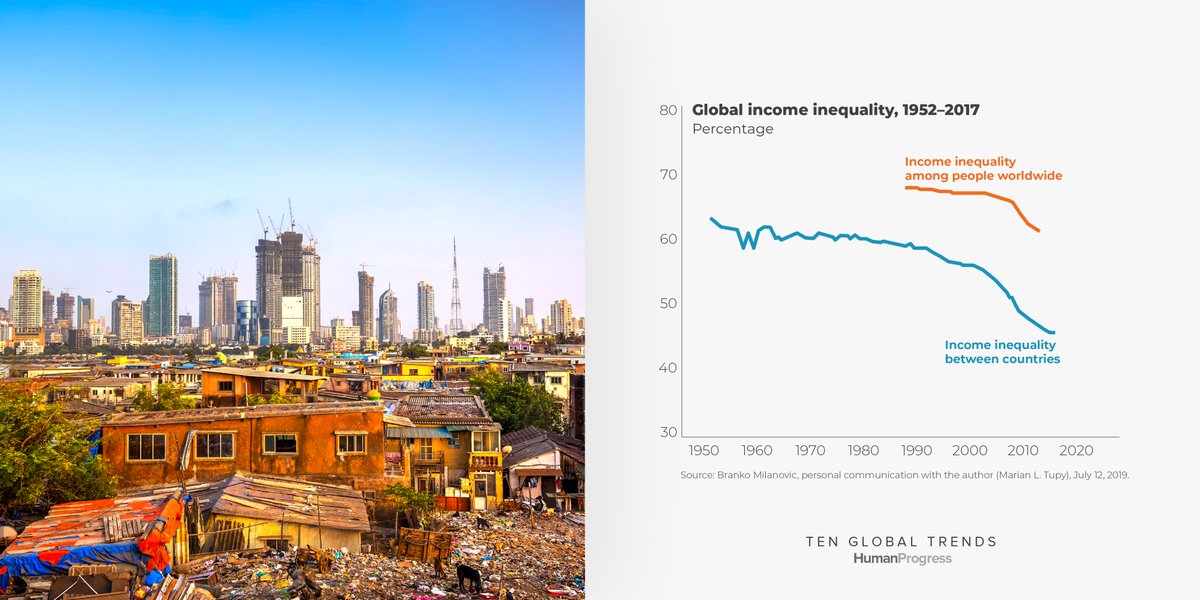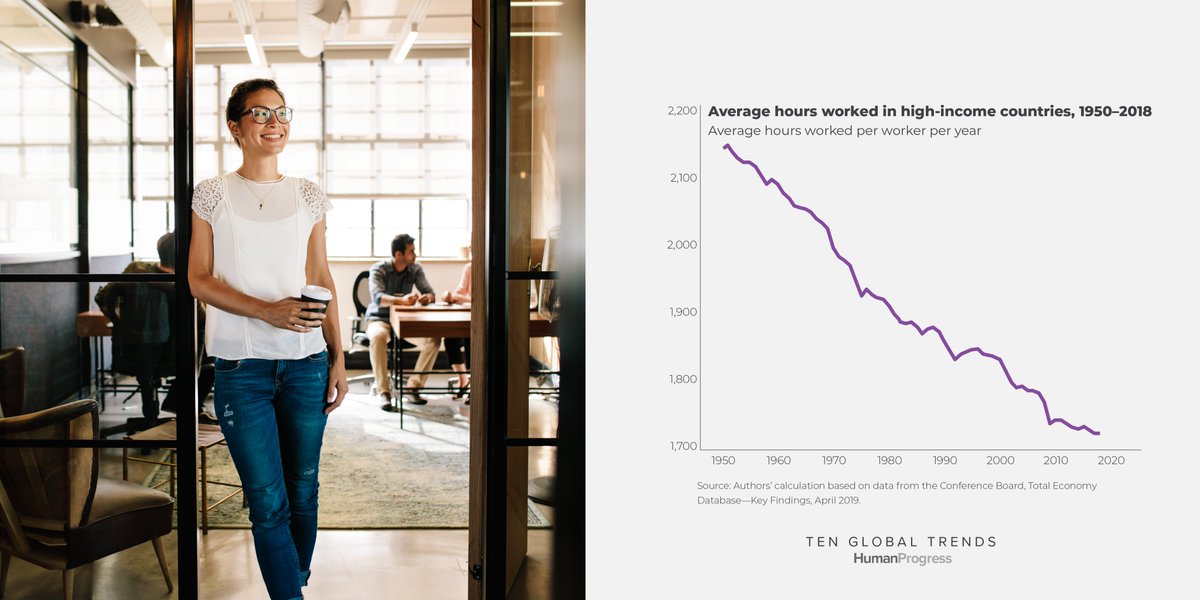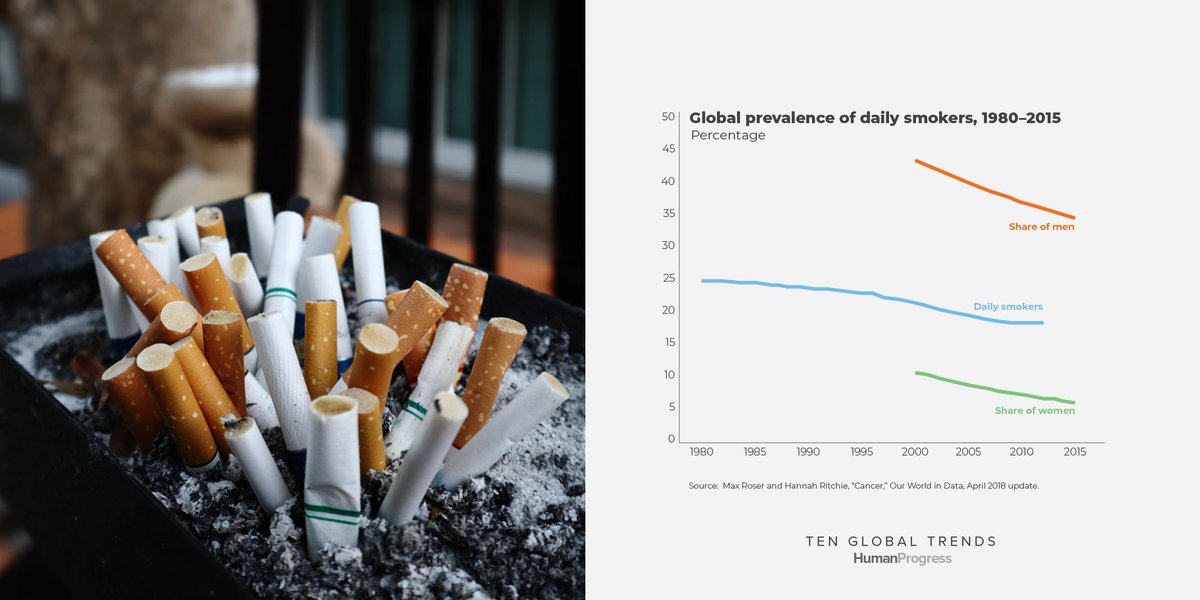April 1st marks the beginning of
#78DaysOfProgress, a thread that will outline seventy-eight different ways the world is getting better.

https://abs.twimg.com/emoji/v2/... draggable="false" alt="🌍" title="Europa-Afrika auf dem Globus" aria-label="Emoji: Europa-Afrika auf dem Globus">

https://abs.twimg.com/emoji/v2/... draggable="false" alt="📈" title="Tabelle mit Aufwärtstrend" aria-label="Emoji: Tabelle mit Aufwärtstrend">
If you can&
#39;t wait that long, you can check out all 78 trends in our bestselling book:
https://www.tenglobaltrends.org/ ">https://www.tenglobaltrends.org/">...

https://abs.twimg.com/emoji/v2/... draggable="false" alt="💉" title="Spritze" aria-label="Emoji: Spritze">Humanity is getting better and better at developing vaccines.
Compare the historical pace of progress with our response time to the COVID-19 pandemic.
Read more about this trend in our book:
http://tenglobaltrends.org">
http://tenglobaltrends.org #78DaysOfProgress(1/78)

https://abs.twimg.com/emoji/v2/... draggable="false" alt="💸" title="Geld mit Flügeln" aria-label="Emoji: Geld mit Flügeln">Global inequality has started to decline–primarily due to faster growth in non-Western countries.
Read more about this trend in our book:
http://tenglobaltrends.org">
http://tenglobaltrends.org #78DaysOfProgress(2/78)

https://abs.twimg.com/emoji/v2/... draggable="false" alt="🧑⚖️" title="Richter(in)" aria-label="Emoji: Richter(in)">The global homicide rate fell 17% between 1990 and 2017 as the rule of law, fairer judicial systems, and better policing spread to more countries around the world.
Read more about this trend in our book:
http://tenglobaltrends.org">
http://tenglobaltrends.org #78DaysOfProgress(3/78)

https://abs.twimg.com/emoji/v2/... draggable="false" alt="⚙️" title="Zahnrad" aria-label="Emoji: Zahnrad"> CO2 emissions per dollar of GDP have fallen as businesses reduce their energy costs.
Absolute CO2 emissions have yet to fall outside of economic recessions, but emission efficiency is a step in the right direction.
Read more:
http://tenglobaltrends.org">
http://tenglobaltrends.org #78DaysOfProgress(4/78)

https://abs.twimg.com/emoji/v2/... draggable="false" alt="🪖" title="Military helmet" aria-label="Emoji: Military helmet"> The global battle death rate fell 95% between 1953 and 2016.
Some scholars attribute this trend to TV news, arguing that seeing the horrors of war on-screen made us much more sensitive to war casualties.
Read more:
http://tenglobaltrends.org">
http://tenglobaltrends.org #78DaysOfProgress(5/78)

https://abs.twimg.com/emoji/v2/... draggable="false" alt="🏙️" title="Stadtbild" aria-label="Emoji: Stadtbild">The OECD estimates that 85% of the world’s population will be urbanized by 2100.
That&
#39;s great news. Cities lead to growth and innovation and are good for the environment.
Read more in our book:
http://tenglobaltrends.org">
http://tenglobaltrends.org #78DaysOfProgress(6/78)

https://abs.twimg.com/emoji/v2/... draggable="false" alt="👶" title="Baby" aria-label="Emoji: Baby">Thanks to modern medicine, the global infant mortality rate fell to 29.4 per 1000 live births in 2017.
In premodern societies, 300 out of every 1000 infants died before their first birthday.
Read more about this trend:
http://tenglobaltrends.org">
http://tenglobaltrends.org #78DaysOfProgress(7/78)

https://abs.twimg.com/emoji/v2/... draggable="false" alt="🗽" title="Freiheitsstatue" aria-label="Emoji: Freiheitsstatue">Democracy may not be expanding as fast as it once did, but neither is it in full retreat.
The percentage of countries that qualified as democracies rose from 31 percent in 1989 to 49 percent in 2017.
Read more in our book:
http://tenglobaltrends.org">
http://tenglobaltrends.org #78DaysOfProgress(8/78)

https://abs.twimg.com/emoji/v2/... draggable="false" alt="💡" title="Elektrische Glühbirne" aria-label="Emoji: Elektrische Glühbirne">Electricity is indispensable for basic activities like lighting and refrigeration.
Since 2012, more than 100 million people per year have gained access to electricity.
Read more about this trend:
http://tenglobaltrends.org">
http://tenglobaltrends.org #78DaysOfProgress(9/78)

https://abs.twimg.com/emoji/v2/... draggable="false" alt="🏳️🌈" title="Regenbogen-Flagge" aria-label="Emoji: Regenbogen-Flagge"> Homosexuality was legal in 123 out of the 193 members of the United Nations in 2019.
Some regions still lag behind, but increasing urbanization, education, and wealth will likely make people everywhere more tolerant in the future.
Read more:
http://tenglobaltrends.org">
http://tenglobaltrends.org (10/78)

https://abs.twimg.com/emoji/v2/... draggable="false" alt="🎗️" title="Erinnerungsband" aria-label="Emoji: Erinnerungsband">The risk of dying from cancer increases with age.
While more people die of cancer today than in the past, the age-adjusted cancer death rate fell 17% between 1990 and 2016.
Read more:
http://tenglobaltrends.org">
http://tenglobaltrends.org #78DaysOfProgress(11/78)

https://abs.twimg.com/emoji/v2/... draggable="false" alt="🌋" title="Vulkan" aria-label="Emoji: Vulkan">The chance of a person dying in a natural catastrophe has declined by nearly 99% since the 1920s and 1930s.
Read more about this trend in our book:
http://tenglobaltrends.org">
http://tenglobaltrends.org #78DaysOfProgress(12/78)

https://abs.twimg.com/emoji/v2/... draggable="false" alt="🪖" title="Military helmet" aria-label="Emoji: Military helmet">Over the past half-century, wars between countries have become rarer.
Interstate warfare has declined as countries have become wealthier, more democratic, and more economically intertwined.
Read more:
http://tenglobaltrends.org">
http://tenglobaltrends.org #78DaysOfProgress(13/78)

https://abs.twimg.com/emoji/v2/... draggable="false" alt="♀️" title="Weibliches Zeichen" aria-label="Emoji: Weibliches Zeichen"> The gender wage gap is narrowing, reflecting tremendous progress in gender equality.
It&
#39;s worth noting that after adjusting for job title, education, and experience, the wage gap in many developed nations becomes insignificant.
Read more:
http://tenglobaltrends.org">
http://tenglobaltrends.org (14/78)

https://abs.twimg.com/emoji/v2/... draggable="false" alt="⛽️" title="Benzinpumpe" aria-label="Emoji: Benzinpumpe">Humanity has not yet run out of a single supposedly nonrenewable resource.
In fact, resources tend to become more abundant over time relative to the demand for them.
Learn more about resource abundance and time prices here:
https://www.humanprogress.org/resources-are-more-abundant-than-ever-and-people-are-the-reason/https://www.humanprogress.org/resources... href="https://twtext.com//hashtag/78DaysOfProgress"> #78DaysOfProgress
(15/78)

https://abs.twimg.com/emoji/v2/... draggable="false" alt="👩🌾" title="Bäuerin" aria-label="Emoji: Bäuerin"> The amount of land devoted to food production may soon begin to fall as population growth slows and agricultural productivity increases.
Researchers predict 146 million hectares will return to nature by 2060.
Read more:
http://tenglobaltrends.org">
http://tenglobaltrends.org #78DaysOfProgress(16/78)

https://abs.twimg.com/emoji/v2/... draggable="false" alt="💀" title="Schädel" aria-label="Emoji: Schädel">In 2018, Amnesty International noted that “106 countries had abolished the death penalty in law for all crimes."
Most executions today take place in China, Iran, Iraq, Saudi Arabia, and Vietnam.
Read more in our book:
http://tenglobaltrends.org">
http://tenglobaltrends.org #78DaysOfProgress(17/78)
 In 2018, Amnesty International noted that “106 countries had abolished the death penalty in law for all crimes."Most executions today take place in China, Iran, Iraq, Saudi Arabia, and Vietnam.Read more in our book: http://tenglobaltrends.org #78DaysOfProgress(17/78)" title="https://abs.twimg.com/emoji/v2/... draggable="false" alt="💀" title="Schädel" aria-label="Emoji: Schädel">In 2018, Amnesty International noted that “106 countries had abolished the death penalty in law for all crimes."Most executions today take place in China, Iran, Iraq, Saudi Arabia, and Vietnam.Read more in our book: http://tenglobaltrends.org #78DaysOfProgress(17/78)" class="img-responsive" style="max-width:100%;"/>
In 2018, Amnesty International noted that “106 countries had abolished the death penalty in law for all crimes."Most executions today take place in China, Iran, Iraq, Saudi Arabia, and Vietnam.Read more in our book: http://tenglobaltrends.org #78DaysOfProgress(17/78)" title="https://abs.twimg.com/emoji/v2/... draggable="false" alt="💀" title="Schädel" aria-label="Emoji: Schädel">In 2018, Amnesty International noted that “106 countries had abolished the death penalty in law for all crimes."Most executions today take place in China, Iran, Iraq, Saudi Arabia, and Vietnam.Read more in our book: http://tenglobaltrends.org #78DaysOfProgress(17/78)" class="img-responsive" style="max-width:100%;"/>

https://abs.twimg.com/emoji/v2/... draggable="false" alt="☁️" title="Wolke" aria-label="Emoji: Wolke">Air pollution in the U.S. is falling steeply.
The EPA reports that between 1970 and 2018, total emissions of the six principal air pollutants dropped by 74% despite a 275% increase in GDP.
Read more in our book:
http://tenglobaltrends.org">
http://tenglobaltrends.org #78DaysOfProgress(18/78)

https://abs.twimg.com/emoji/v2/... draggable="false" alt="✈️" title="Flugzeug" aria-label="Emoji: Flugzeug"> Since the Airline Deregulation Act of 1978, American airfare has plummeted.
According to economist Mark J. Perry, the average round-trip U.S. domestic airfare fell 43% between 1979 and 2017.
Read more:
http://tenglobaltrends.org">
http://tenglobaltrends.org #78DaysOfProgress(19/78)

https://abs.twimg.com/emoji/v2/... draggable="false" alt="🕊️" title="Friedens-Taube" aria-label="Emoji: Friedens-Taube"> While the number of nuclear powers has increased since 1991, the total quantity of warheads has declined.
At the height of the cold war, there were 64,449 nuclear warheads. In 2018, there were 9,305.
Read more:
http://tenglobaltrends.org">
http://tenglobaltrends.org #78DaysOfProgresss(20/78)
 While the number of nuclear powers has increased since 1991, the total quantity of warheads has declined.At the height of the cold war, there were 64,449 nuclear warheads. In 2018, there were 9,305.Read more: http://tenglobaltrends.org #78DaysOfProgresss(20/78)" title="https://abs.twimg.com/emoji/v2/... draggable="false" alt="🕊️" title="Friedens-Taube" aria-label="Emoji: Friedens-Taube"> While the number of nuclear powers has increased since 1991, the total quantity of warheads has declined.At the height of the cold war, there were 64,449 nuclear warheads. In 2018, there were 9,305.Read more: http://tenglobaltrends.org #78DaysOfProgresss(20/78)" class="img-responsive" style="max-width:100%;"/>
While the number of nuclear powers has increased since 1991, the total quantity of warheads has declined.At the height of the cold war, there were 64,449 nuclear warheads. In 2018, there were 9,305.Read more: http://tenglobaltrends.org #78DaysOfProgresss(20/78)" title="https://abs.twimg.com/emoji/v2/... draggable="false" alt="🕊️" title="Friedens-Taube" aria-label="Emoji: Friedens-Taube"> While the number of nuclear powers has increased since 1991, the total quantity of warheads has declined.At the height of the cold war, there were 64,449 nuclear warheads. In 2018, there were 9,305.Read more: http://tenglobaltrends.org #78DaysOfProgresss(20/78)" class="img-responsive" style="max-width:100%;"/>

https://abs.twimg.com/emoji/v2/... draggable="false" alt="🥘" title="Flache Pfanne mit Essen" aria-label="Emoji: Flache Pfanne mit Essen">While war and political violence still cause famines, hunger no longer haunts the vast majority of humankind.
The FAO reports that the global prevalence of undernourishment fell to a low of 10.6% in 2015.
Read more:
http://tenglobaltrends.org">
http://tenglobaltrends.org #78DaysOfProgress(21/78)

https://abs.twimg.com/emoji/v2/... draggable="false" alt="🔨" title="Hammer" aria-label="Emoji: Hammer"> Simply put, the richer the country, the less people work.
The average annual hours worked per worker in 81 developed countries declined from 2,123 in 1950 to 1,732 in 2017.
Read more:
http://tenglobaltrends.org">
http://tenglobaltrends.org #78DaysOfProgress(22/78)

https://abs.twimg.com/emoji/v2/... draggable="false" alt="🧒" title="Kind" aria-label="Emoji: Kind">Child labor was once ubiquitous. Today, it is on the decline.
According to the ILO, child laborers as a proportion of all children ages 5 to 17 dropped globally from 16% in 2000 to 9.6% in 2016.
Read more:
http://tenglobaltrends.org">
http://tenglobaltrends.org #78DaysOfProgress(23/78)

https://abs.twimg.com/emoji/v2/... draggable="false" alt="🌾" title="Reisgetreide" aria-label="Emoji: Reisgetreide">Between 1961 and 2017, world grain production nearly quadrupled.
This increase in production took place even though the amount of land used to cultivate food crops only increased by around 15% in the same period.
Read more:
http://tenglobaltrends.org">
http://tenglobaltrends.org #78DaysOfProgress(24/78)

https://abs.twimg.com/emoji/v2/... draggable="false" alt="💧" title="Tröpfchen" aria-label="Emoji: Tröpfchen">Renewable water reserves per person are declining, so it&
#39;s important to get the most out of the water we use.
Luckily, some of the world&
#39;s largest economies are setting a good example for the rest of the world.
Read more:
http://tenglobaltrends.org">
http://tenglobaltrends.org #78DaysOfProgress(25/78)

https://abs.twimg.com/emoji/v2/... draggable="false" alt="💉" title="Spritze" aria-label="Emoji: Spritze">The world has come a long way since Edward Jenner performed his first smallpox vaccination in 1796.
As of 2018, global vaccination coverage remains at 85%.
Read more:
http://tenglobaltrends.org">
http://tenglobaltrends.org #WorldImmunizationWeek (26/78)

https://abs.twimg.com/emoji/v2/... draggable="false" alt="🍖" title="Fleischknochen" aria-label="Emoji: Fleischknochen"> People around the world are eating more protein as they become wealthier.
And meat and dairy aren&
#39;t as wasteful as people say: 86% of global livestock feed consists of grasses and crop residues that are inedible to humans.
Read more:
http://tenglobaltrends.org">
http://tenglobaltrends.org (27/78)

https://abs.twimg.com/emoji/v2/... draggable="false" alt="📱" title="Mobiltelefon" aria-label="Emoji: Mobiltelefon">“Dematerialization” refers to reducing material and energy consumption per unit of GDP.
By making a myriad of older devices obsolete, smartphones can reduce material use by a factor of 300 and power use by a factor of 100.
Read more:
http://tenglobaltrends.org">
http://tenglobaltrends.org (28/78)

https://abs.twimg.com/emoji/v2/... draggable="false" alt="🧠" title="Gehirn" aria-label="Emoji: Gehirn">Over the past century, people have been getting a lot smarter.
In fact, IQ tests are "renormed" every 15-20 years to account for this trend. A person with a score of 100 in 1965 would likely score just 85 points on current tests.
Read more:
http://tenglobaltrends.org">
http://tenglobaltrends.org (29/78)

https://abs.twimg.com/emoji/v2/... draggable="false" alt="🏡" title="Haus mit Garten" aria-label="Emoji: Haus mit Garten"> In the U.S., houses are getting bigger as households are getting smaller.
As such, the average American&
#39;s living space nearly doubled between 1973 and 2017.
Read more:
http://tenglobaltrends.org">
http://tenglobaltrends.org #78DaysOfProgress(30/78)

https://abs.twimg.com/emoji/v2/... draggable="false" alt="🚭" title="Rauchverbot-Zeichen" aria-label="Emoji: Rauchverbot-Zeichen">Because of population growth, the absolute number of daily smokers has continued to rise.
However, the global prevalence of daily smokers fell from 25.1% to 18.6% between 1980 and 2012.
Read more:
http://tenglobaltrends.org">
http://tenglobaltrends.org #78DaysOfProgress(31/78)

https://abs.twimg.com/emoji/v2/... draggable="false" alt="⛽️" title="Benzinpumpe" aria-label="Emoji: Benzinpumpe"> In 2000, the Saudi oil minister declared, “the Stone Age came to an end not because we had a lack of stones, and the oil age will come to an end not because we have a lack of oil.”
Indeed, proven crude oil reserves have nearly tripled since 1980.
#78DaysOfProgress(32/78)

https://abs.twimg.com/emoji/v2/... draggable="false" alt="📰" title="Zeitung" aria-label="Emoji: Zeitung"> No human right is more important than free speech. Without it, no other rights can be asserted and defended.
While the press has become freer since the 1980s, recent setbacks make its future uncertain.
Read more:
http://tenglobaltrends.org">
http://tenglobaltrends.org #WorldPressFreedomDay (33/78)

https://abs.twimg.com/emoji/v2/... draggable="false" alt="🌾" title="Reisgetreide" aria-label="Emoji: Reisgetreide">Thanks to hybridization, nitrogen fertilizer, improved pest controls, and genetically enhanced crops, global cereal yields have more than doubled since 1961.
Read more about this trend in our book:
http://tenglobaltrends.org">
http://tenglobaltrends.org #78DaysOfProgress(34/78)

https://abs.twimg.com/emoji/v2/... draggable="false" alt="🎗️" title="Erinnerungsband" aria-label="Emoji: Erinnerungsband">Thanks to falling rates of smoking and advances in early detection and treatment, cancer incidence and mortality rates are at a 26-year low in the U.S.
Read more:
http://tenglobaltrends.org">
http://tenglobaltrends.org #78DaysOfProgresss(35/78)

https://abs.twimg.com/emoji/v2/... draggable="false" alt="👵" title="Ältere Frau" aria-label="Emoji: Ältere Frau">During the past 200 years, global life expectancy has more than doubled.
The U.N. estimates that the average life expectancy will be 83 by the end of the century.
Read more:
http://tenglobaltrends.org">
http://tenglobaltrends.org #78DaysOfProgress(36/78)

https://abs.twimg.com/emoji/v2/... draggable="false" alt="⛓️" title="Ketten" aria-label="Emoji: Ketten">While slavery still plagues the modern world, it has completely lost its legal status.
In 2007, Mauritania became the last country to criminalize enslavement.
Read more:
http://tenglobaltrends.org">
http://tenglobaltrends.org #78DaysOfProgress(37/78)

https://abs.twimg.com/emoji/v2/... draggable="false" alt="🪖" title="Military helmet" aria-label="Emoji: Military helmet">If military spending had kept pace with economic growth since 1960, the world&
#39;s nations would have spent $3.2 trillion on their militaries in 2017.
Instead, they spent $1.7 trillion.
Read more:
http://tengobaltrends.org">
http://tengobaltrends.org #78DaysOfProgress(38/78)

https://abs.twimg.com/emoji/v2/... draggable="false" alt="👩🏾🤝👨🏻" title=" (durchschnittlich dunkler Hautton)" aria-label="Emoji: (durchschnittlich dunkler Hautton)">Back in 1958, only 4% of white Americans were in favor of intermarriage between blacks and whites.
By 2013, 87% of white Americans approved of interracial marriage.
Read more:
http://tenglobaltrends.org">
http://tenglobaltrends.org #78DaysOfProgress(39/78)

https://abs.twimg.com/emoji/v2/... draggable="false" alt="⚰️" title="Sarg" aria-label="Emoji: Sarg">It turns out that death itself is in retreat.
Thanks to falling infant mortality rates, the death rates in some less developed countries are lower than the death rates in richer countries with older citizens.
Read more:
http://tenglobaltrends.org">
http://tenglobaltrends.org #78DaysOfProgress(40/78)

https://abs.twimg.com/emoji/v2/... draggable="false" alt="🌳" title="Laubbaum" aria-label="Emoji: Laubbaum">Global tree cover increased by 2.24 million square kilometers between 1982 and 2016, according to researchers at the University of Maryland.
Humanity has begun the process of withdrawing from the natural world.
Read more:
http://tenglobaltrends.org">
http://tenglobaltrends.org #78DaysOfProgress(41/78)
Tip: mention @twtextapp on a Twitter thread with the keyword “unroll” to get a link to it.
 https://abs.twimg.com/emoji/v2/... draggable="false" alt="🌍" title="Europa-Afrika auf dem Globus" aria-label="Emoji: Europa-Afrika auf dem Globus">
https://abs.twimg.com/emoji/v2/... draggable="false" alt="🌍" title="Europa-Afrika auf dem Globus" aria-label="Emoji: Europa-Afrika auf dem Globus"> https://abs.twimg.com/emoji/v2/... draggable="false" alt="📈" title="Tabelle mit Aufwärtstrend" aria-label="Emoji: Tabelle mit Aufwärtstrend">
https://abs.twimg.com/emoji/v2/... draggable="false" alt="📈" title="Tabelle mit Aufwärtstrend" aria-label="Emoji: Tabelle mit Aufwärtstrend">
 Read on Twitter
Read on Twitter Humanity is getting better and better at developing vaccines.Compare the historical pace of progress with our response time to the COVID-19 pandemic.Read more about this trend in our book: http://tenglobaltrends.org #78DaysOfProgress(1/78)" title="https://abs.twimg.com/emoji/v2/... draggable="false" alt="💉" title="Spritze" aria-label="Emoji: Spritze">Humanity is getting better and better at developing vaccines.Compare the historical pace of progress with our response time to the COVID-19 pandemic.Read more about this trend in our book: http://tenglobaltrends.org #78DaysOfProgress(1/78)" class="img-responsive" style="max-width:100%;"/>
Humanity is getting better and better at developing vaccines.Compare the historical pace of progress with our response time to the COVID-19 pandemic.Read more about this trend in our book: http://tenglobaltrends.org #78DaysOfProgress(1/78)" title="https://abs.twimg.com/emoji/v2/... draggable="false" alt="💉" title="Spritze" aria-label="Emoji: Spritze">Humanity is getting better and better at developing vaccines.Compare the historical pace of progress with our response time to the COVID-19 pandemic.Read more about this trend in our book: http://tenglobaltrends.org #78DaysOfProgress(1/78)" class="img-responsive" style="max-width:100%;"/>
 Global inequality has started to decline–primarily due to faster growth in non-Western countries.Read more about this trend in our book: http://tenglobaltrends.org #78DaysOfProgress(2/78)" title="https://abs.twimg.com/emoji/v2/... draggable="false" alt="💸" title="Geld mit Flügeln" aria-label="Emoji: Geld mit Flügeln">Global inequality has started to decline–primarily due to faster growth in non-Western countries.Read more about this trend in our book: http://tenglobaltrends.org #78DaysOfProgress(2/78)" class="img-responsive" style="max-width:100%;"/>
Global inequality has started to decline–primarily due to faster growth in non-Western countries.Read more about this trend in our book: http://tenglobaltrends.org #78DaysOfProgress(2/78)" title="https://abs.twimg.com/emoji/v2/... draggable="false" alt="💸" title="Geld mit Flügeln" aria-label="Emoji: Geld mit Flügeln">Global inequality has started to decline–primarily due to faster growth in non-Western countries.Read more about this trend in our book: http://tenglobaltrends.org #78DaysOfProgress(2/78)" class="img-responsive" style="max-width:100%;"/>
 The global homicide rate fell 17% between 1990 and 2017 as the rule of law, fairer judicial systems, and better policing spread to more countries around the world.Read more about this trend in our book: http://tenglobaltrends.org #78DaysOfProgress(3/78)" title="https://abs.twimg.com/emoji/v2/... draggable="false" alt="🧑⚖️" title="Richter(in)" aria-label="Emoji: Richter(in)">The global homicide rate fell 17% between 1990 and 2017 as the rule of law, fairer judicial systems, and better policing spread to more countries around the world.Read more about this trend in our book: http://tenglobaltrends.org #78DaysOfProgress(3/78)" class="img-responsive" style="max-width:100%;"/>
The global homicide rate fell 17% between 1990 and 2017 as the rule of law, fairer judicial systems, and better policing spread to more countries around the world.Read more about this trend in our book: http://tenglobaltrends.org #78DaysOfProgress(3/78)" title="https://abs.twimg.com/emoji/v2/... draggable="false" alt="🧑⚖️" title="Richter(in)" aria-label="Emoji: Richter(in)">The global homicide rate fell 17% between 1990 and 2017 as the rule of law, fairer judicial systems, and better policing spread to more countries around the world.Read more about this trend in our book: http://tenglobaltrends.org #78DaysOfProgress(3/78)" class="img-responsive" style="max-width:100%;"/>
 CO2 emissions per dollar of GDP have fallen as businesses reduce their energy costs.Absolute CO2 emissions have yet to fall outside of economic recessions, but emission efficiency is a step in the right direction.Read more: http://tenglobaltrends.org #78DaysOfProgress(4/78)" title="https://abs.twimg.com/emoji/v2/... draggable="false" alt="⚙️" title="Zahnrad" aria-label="Emoji: Zahnrad"> CO2 emissions per dollar of GDP have fallen as businesses reduce their energy costs.Absolute CO2 emissions have yet to fall outside of economic recessions, but emission efficiency is a step in the right direction.Read more: http://tenglobaltrends.org #78DaysOfProgress(4/78)" class="img-responsive" style="max-width:100%;"/>
CO2 emissions per dollar of GDP have fallen as businesses reduce their energy costs.Absolute CO2 emissions have yet to fall outside of economic recessions, but emission efficiency is a step in the right direction.Read more: http://tenglobaltrends.org #78DaysOfProgress(4/78)" title="https://abs.twimg.com/emoji/v2/... draggable="false" alt="⚙️" title="Zahnrad" aria-label="Emoji: Zahnrad"> CO2 emissions per dollar of GDP have fallen as businesses reduce their energy costs.Absolute CO2 emissions have yet to fall outside of economic recessions, but emission efficiency is a step in the right direction.Read more: http://tenglobaltrends.org #78DaysOfProgress(4/78)" class="img-responsive" style="max-width:100%;"/>
 The global battle death rate fell 95% between 1953 and 2016.Some scholars attribute this trend to TV news, arguing that seeing the horrors of war on-screen made us much more sensitive to war casualties.Read more: http://tenglobaltrends.org #78DaysOfProgress(5/78)" title="https://abs.twimg.com/emoji/v2/... draggable="false" alt="🪖" title="Military helmet" aria-label="Emoji: Military helmet"> The global battle death rate fell 95% between 1953 and 2016.Some scholars attribute this trend to TV news, arguing that seeing the horrors of war on-screen made us much more sensitive to war casualties.Read more: http://tenglobaltrends.org #78DaysOfProgress(5/78)" class="img-responsive" style="max-width:100%;"/>
The global battle death rate fell 95% between 1953 and 2016.Some scholars attribute this trend to TV news, arguing that seeing the horrors of war on-screen made us much more sensitive to war casualties.Read more: http://tenglobaltrends.org #78DaysOfProgress(5/78)" title="https://abs.twimg.com/emoji/v2/... draggable="false" alt="🪖" title="Military helmet" aria-label="Emoji: Military helmet"> The global battle death rate fell 95% between 1953 and 2016.Some scholars attribute this trend to TV news, arguing that seeing the horrors of war on-screen made us much more sensitive to war casualties.Read more: http://tenglobaltrends.org #78DaysOfProgress(5/78)" class="img-responsive" style="max-width:100%;"/>
 The OECD estimates that 85% of the world’s population will be urbanized by 2100.That& #39;s great news. Cities lead to growth and innovation and are good for the environment.Read more in our book: http://tenglobaltrends.org #78DaysOfProgress(6/78)" title="https://abs.twimg.com/emoji/v2/... draggable="false" alt="🏙️" title="Stadtbild" aria-label="Emoji: Stadtbild">The OECD estimates that 85% of the world’s population will be urbanized by 2100.That& #39;s great news. Cities lead to growth and innovation and are good for the environment.Read more in our book: http://tenglobaltrends.org #78DaysOfProgress(6/78)" class="img-responsive" style="max-width:100%;"/>
The OECD estimates that 85% of the world’s population will be urbanized by 2100.That& #39;s great news. Cities lead to growth and innovation and are good for the environment.Read more in our book: http://tenglobaltrends.org #78DaysOfProgress(6/78)" title="https://abs.twimg.com/emoji/v2/... draggable="false" alt="🏙️" title="Stadtbild" aria-label="Emoji: Stadtbild">The OECD estimates that 85% of the world’s population will be urbanized by 2100.That& #39;s great news. Cities lead to growth and innovation and are good for the environment.Read more in our book: http://tenglobaltrends.org #78DaysOfProgress(6/78)" class="img-responsive" style="max-width:100%;"/>
 Thanks to modern medicine, the global infant mortality rate fell to 29.4 per 1000 live births in 2017.In premodern societies, 300 out of every 1000 infants died before their first birthday.Read more about this trend: http://tenglobaltrends.org #78DaysOfProgress(7/78)" title="https://abs.twimg.com/emoji/v2/... draggable="false" alt="👶" title="Baby" aria-label="Emoji: Baby">Thanks to modern medicine, the global infant mortality rate fell to 29.4 per 1000 live births in 2017.In premodern societies, 300 out of every 1000 infants died before their first birthday.Read more about this trend: http://tenglobaltrends.org #78DaysOfProgress(7/78)" class="img-responsive" style="max-width:100%;"/>
Thanks to modern medicine, the global infant mortality rate fell to 29.4 per 1000 live births in 2017.In premodern societies, 300 out of every 1000 infants died before their first birthday.Read more about this trend: http://tenglobaltrends.org #78DaysOfProgress(7/78)" title="https://abs.twimg.com/emoji/v2/... draggable="false" alt="👶" title="Baby" aria-label="Emoji: Baby">Thanks to modern medicine, the global infant mortality rate fell to 29.4 per 1000 live births in 2017.In premodern societies, 300 out of every 1000 infants died before their first birthday.Read more about this trend: http://tenglobaltrends.org #78DaysOfProgress(7/78)" class="img-responsive" style="max-width:100%;"/>
 Democracy may not be expanding as fast as it once did, but neither is it in full retreat. The percentage of countries that qualified as democracies rose from 31 percent in 1989 to 49 percent in 2017.Read more in our book: http://tenglobaltrends.org #78DaysOfProgress(8/78)" title="https://abs.twimg.com/emoji/v2/... draggable="false" alt="🗽" title="Freiheitsstatue" aria-label="Emoji: Freiheitsstatue">Democracy may not be expanding as fast as it once did, but neither is it in full retreat. The percentage of countries that qualified as democracies rose from 31 percent in 1989 to 49 percent in 2017.Read more in our book: http://tenglobaltrends.org #78DaysOfProgress(8/78)" class="img-responsive" style="max-width:100%;"/>
Democracy may not be expanding as fast as it once did, but neither is it in full retreat. The percentage of countries that qualified as democracies rose from 31 percent in 1989 to 49 percent in 2017.Read more in our book: http://tenglobaltrends.org #78DaysOfProgress(8/78)" title="https://abs.twimg.com/emoji/v2/... draggable="false" alt="🗽" title="Freiheitsstatue" aria-label="Emoji: Freiheitsstatue">Democracy may not be expanding as fast as it once did, but neither is it in full retreat. The percentage of countries that qualified as democracies rose from 31 percent in 1989 to 49 percent in 2017.Read more in our book: http://tenglobaltrends.org #78DaysOfProgress(8/78)" class="img-responsive" style="max-width:100%;"/>
 Electricity is indispensable for basic activities like lighting and refrigeration.Since 2012, more than 100 million people per year have gained access to electricity.Read more about this trend: http://tenglobaltrends.org #78DaysOfProgress(9/78)" title="https://abs.twimg.com/emoji/v2/... draggable="false" alt="💡" title="Elektrische Glühbirne" aria-label="Emoji: Elektrische Glühbirne">Electricity is indispensable for basic activities like lighting and refrigeration.Since 2012, more than 100 million people per year have gained access to electricity.Read more about this trend: http://tenglobaltrends.org #78DaysOfProgress(9/78)" class="img-responsive" style="max-width:100%;"/>
Electricity is indispensable for basic activities like lighting and refrigeration.Since 2012, more than 100 million people per year have gained access to electricity.Read more about this trend: http://tenglobaltrends.org #78DaysOfProgress(9/78)" title="https://abs.twimg.com/emoji/v2/... draggable="false" alt="💡" title="Elektrische Glühbirne" aria-label="Emoji: Elektrische Glühbirne">Electricity is indispensable for basic activities like lighting and refrigeration.Since 2012, more than 100 million people per year have gained access to electricity.Read more about this trend: http://tenglobaltrends.org #78DaysOfProgress(9/78)" class="img-responsive" style="max-width:100%;"/>
 Homosexuality was legal in 123 out of the 193 members of the United Nations in 2019.Some regions still lag behind, but increasing urbanization, education, and wealth will likely make people everywhere more tolerant in the future.Read more: http://tenglobaltrends.org (10/78)" title="https://abs.twimg.com/emoji/v2/... draggable="false" alt="🏳️🌈" title="Regenbogen-Flagge" aria-label="Emoji: Regenbogen-Flagge"> Homosexuality was legal in 123 out of the 193 members of the United Nations in 2019.Some regions still lag behind, but increasing urbanization, education, and wealth will likely make people everywhere more tolerant in the future.Read more: http://tenglobaltrends.org (10/78)" class="img-responsive" style="max-width:100%;"/>
Homosexuality was legal in 123 out of the 193 members of the United Nations in 2019.Some regions still lag behind, but increasing urbanization, education, and wealth will likely make people everywhere more tolerant in the future.Read more: http://tenglobaltrends.org (10/78)" title="https://abs.twimg.com/emoji/v2/... draggable="false" alt="🏳️🌈" title="Regenbogen-Flagge" aria-label="Emoji: Regenbogen-Flagge"> Homosexuality was legal in 123 out of the 193 members of the United Nations in 2019.Some regions still lag behind, but increasing urbanization, education, and wealth will likely make people everywhere more tolerant in the future.Read more: http://tenglobaltrends.org (10/78)" class="img-responsive" style="max-width:100%;"/>
 The risk of dying from cancer increases with age. While more people die of cancer today than in the past, the age-adjusted cancer death rate fell 17% between 1990 and 2016.Read more: http://tenglobaltrends.org #78DaysOfProgress(11/78)" title="https://abs.twimg.com/emoji/v2/... draggable="false" alt="🎗️" title="Erinnerungsband" aria-label="Emoji: Erinnerungsband">The risk of dying from cancer increases with age. While more people die of cancer today than in the past, the age-adjusted cancer death rate fell 17% between 1990 and 2016.Read more: http://tenglobaltrends.org #78DaysOfProgress(11/78)" class="img-responsive" style="max-width:100%;"/>
The risk of dying from cancer increases with age. While more people die of cancer today than in the past, the age-adjusted cancer death rate fell 17% between 1990 and 2016.Read more: http://tenglobaltrends.org #78DaysOfProgress(11/78)" title="https://abs.twimg.com/emoji/v2/... draggable="false" alt="🎗️" title="Erinnerungsband" aria-label="Emoji: Erinnerungsband">The risk of dying from cancer increases with age. While more people die of cancer today than in the past, the age-adjusted cancer death rate fell 17% between 1990 and 2016.Read more: http://tenglobaltrends.org #78DaysOfProgress(11/78)" class="img-responsive" style="max-width:100%;"/>
 The chance of a person dying in a natural catastrophe has declined by nearly 99% since the 1920s and 1930s.Read more about this trend in our book: http://tenglobaltrends.org #78DaysOfProgress(12/78)" title="https://abs.twimg.com/emoji/v2/... draggable="false" alt="🌋" title="Vulkan" aria-label="Emoji: Vulkan">The chance of a person dying in a natural catastrophe has declined by nearly 99% since the 1920s and 1930s.Read more about this trend in our book: http://tenglobaltrends.org #78DaysOfProgress(12/78)" class="img-responsive" style="max-width:100%;"/>
The chance of a person dying in a natural catastrophe has declined by nearly 99% since the 1920s and 1930s.Read more about this trend in our book: http://tenglobaltrends.org #78DaysOfProgress(12/78)" title="https://abs.twimg.com/emoji/v2/... draggable="false" alt="🌋" title="Vulkan" aria-label="Emoji: Vulkan">The chance of a person dying in a natural catastrophe has declined by nearly 99% since the 1920s and 1930s.Read more about this trend in our book: http://tenglobaltrends.org #78DaysOfProgress(12/78)" class="img-responsive" style="max-width:100%;"/>
 Over the past half-century, wars between countries have become rarer.Interstate warfare has declined as countries have become wealthier, more democratic, and more economically intertwined.Read more: http://tenglobaltrends.org #78DaysOfProgress(13/78)" title="https://abs.twimg.com/emoji/v2/... draggable="false" alt="🪖" title="Military helmet" aria-label="Emoji: Military helmet">Over the past half-century, wars between countries have become rarer.Interstate warfare has declined as countries have become wealthier, more democratic, and more economically intertwined.Read more: http://tenglobaltrends.org #78DaysOfProgress(13/78)" class="img-responsive" style="max-width:100%;"/>
Over the past half-century, wars between countries have become rarer.Interstate warfare has declined as countries have become wealthier, more democratic, and more economically intertwined.Read more: http://tenglobaltrends.org #78DaysOfProgress(13/78)" title="https://abs.twimg.com/emoji/v2/... draggable="false" alt="🪖" title="Military helmet" aria-label="Emoji: Military helmet">Over the past half-century, wars between countries have become rarer.Interstate warfare has declined as countries have become wealthier, more democratic, and more economically intertwined.Read more: http://tenglobaltrends.org #78DaysOfProgress(13/78)" class="img-responsive" style="max-width:100%;"/>
 The gender wage gap is narrowing, reflecting tremendous progress in gender equality.It& #39;s worth noting that after adjusting for job title, education, and experience, the wage gap in many developed nations becomes insignificant.Read more: http://tenglobaltrends.org (14/78)" title="https://abs.twimg.com/emoji/v2/... draggable="false" alt="♀️" title="Weibliches Zeichen" aria-label="Emoji: Weibliches Zeichen"> The gender wage gap is narrowing, reflecting tremendous progress in gender equality.It& #39;s worth noting that after adjusting for job title, education, and experience, the wage gap in many developed nations becomes insignificant.Read more: http://tenglobaltrends.org (14/78)" class="img-responsive" style="max-width:100%;"/>
The gender wage gap is narrowing, reflecting tremendous progress in gender equality.It& #39;s worth noting that after adjusting for job title, education, and experience, the wage gap in many developed nations becomes insignificant.Read more: http://tenglobaltrends.org (14/78)" title="https://abs.twimg.com/emoji/v2/... draggable="false" alt="♀️" title="Weibliches Zeichen" aria-label="Emoji: Weibliches Zeichen"> The gender wage gap is narrowing, reflecting tremendous progress in gender equality.It& #39;s worth noting that after adjusting for job title, education, and experience, the wage gap in many developed nations becomes insignificant.Read more: http://tenglobaltrends.org (14/78)" class="img-responsive" style="max-width:100%;"/>
 Humanity has not yet run out of a single supposedly nonrenewable resource.In fact, resources tend to become more abundant over time relative to the demand for them.Learn more about resource abundance and time prices here: https://www.humanprogress.org/resources... href="https://twtext.com//hashtag/78DaysOfProgress"> #78DaysOfProgress(15/78)" title="https://abs.twimg.com/emoji/v2/... draggable="false" alt="⛽️" title="Benzinpumpe" aria-label="Emoji: Benzinpumpe">Humanity has not yet run out of a single supposedly nonrenewable resource.In fact, resources tend to become more abundant over time relative to the demand for them.Learn more about resource abundance and time prices here: https://www.humanprogress.org/resources... href="https://twtext.com//hashtag/78DaysOfProgress"> #78DaysOfProgress(15/78)" class="img-responsive" style="max-width:100%;"/>
Humanity has not yet run out of a single supposedly nonrenewable resource.In fact, resources tend to become more abundant over time relative to the demand for them.Learn more about resource abundance and time prices here: https://www.humanprogress.org/resources... href="https://twtext.com//hashtag/78DaysOfProgress"> #78DaysOfProgress(15/78)" title="https://abs.twimg.com/emoji/v2/... draggable="false" alt="⛽️" title="Benzinpumpe" aria-label="Emoji: Benzinpumpe">Humanity has not yet run out of a single supposedly nonrenewable resource.In fact, resources tend to become more abundant over time relative to the demand for them.Learn more about resource abundance and time prices here: https://www.humanprogress.org/resources... href="https://twtext.com//hashtag/78DaysOfProgress"> #78DaysOfProgress(15/78)" class="img-responsive" style="max-width:100%;"/>
 The amount of land devoted to food production may soon begin to fall as population growth slows and agricultural productivity increases.Researchers predict 146 million hectares will return to nature by 2060.Read more: http://tenglobaltrends.org #78DaysOfProgress(16/78)" title="https://abs.twimg.com/emoji/v2/... draggable="false" alt="👩🌾" title="Bäuerin" aria-label="Emoji: Bäuerin"> The amount of land devoted to food production may soon begin to fall as population growth slows and agricultural productivity increases.Researchers predict 146 million hectares will return to nature by 2060.Read more: http://tenglobaltrends.org #78DaysOfProgress(16/78)" class="img-responsive" style="max-width:100%;"/>
The amount of land devoted to food production may soon begin to fall as population growth slows and agricultural productivity increases.Researchers predict 146 million hectares will return to nature by 2060.Read more: http://tenglobaltrends.org #78DaysOfProgress(16/78)" title="https://abs.twimg.com/emoji/v2/... draggable="false" alt="👩🌾" title="Bäuerin" aria-label="Emoji: Bäuerin"> The amount of land devoted to food production may soon begin to fall as population growth slows and agricultural productivity increases.Researchers predict 146 million hectares will return to nature by 2060.Read more: http://tenglobaltrends.org #78DaysOfProgress(16/78)" class="img-responsive" style="max-width:100%;"/>
 In 2018, Amnesty International noted that “106 countries had abolished the death penalty in law for all crimes."Most executions today take place in China, Iran, Iraq, Saudi Arabia, and Vietnam.Read more in our book: http://tenglobaltrends.org #78DaysOfProgress(17/78)" title="https://abs.twimg.com/emoji/v2/... draggable="false" alt="💀" title="Schädel" aria-label="Emoji: Schädel">In 2018, Amnesty International noted that “106 countries had abolished the death penalty in law for all crimes."Most executions today take place in China, Iran, Iraq, Saudi Arabia, and Vietnam.Read more in our book: http://tenglobaltrends.org #78DaysOfProgress(17/78)" class="img-responsive" style="max-width:100%;"/>
In 2018, Amnesty International noted that “106 countries had abolished the death penalty in law for all crimes."Most executions today take place in China, Iran, Iraq, Saudi Arabia, and Vietnam.Read more in our book: http://tenglobaltrends.org #78DaysOfProgress(17/78)" title="https://abs.twimg.com/emoji/v2/... draggable="false" alt="💀" title="Schädel" aria-label="Emoji: Schädel">In 2018, Amnesty International noted that “106 countries had abolished the death penalty in law for all crimes."Most executions today take place in China, Iran, Iraq, Saudi Arabia, and Vietnam.Read more in our book: http://tenglobaltrends.org #78DaysOfProgress(17/78)" class="img-responsive" style="max-width:100%;"/>
 Air pollution in the U.S. is falling steeply.The EPA reports that between 1970 and 2018, total emissions of the six principal air pollutants dropped by 74% despite a 275% increase in GDP.Read more in our book: http://tenglobaltrends.org #78DaysOfProgress(18/78)" title="https://abs.twimg.com/emoji/v2/... draggable="false" alt="☁️" title="Wolke" aria-label="Emoji: Wolke">Air pollution in the U.S. is falling steeply.The EPA reports that between 1970 and 2018, total emissions of the six principal air pollutants dropped by 74% despite a 275% increase in GDP.Read more in our book: http://tenglobaltrends.org #78DaysOfProgress(18/78)" class="img-responsive" style="max-width:100%;"/>
Air pollution in the U.S. is falling steeply.The EPA reports that between 1970 and 2018, total emissions of the six principal air pollutants dropped by 74% despite a 275% increase in GDP.Read more in our book: http://tenglobaltrends.org #78DaysOfProgress(18/78)" title="https://abs.twimg.com/emoji/v2/... draggable="false" alt="☁️" title="Wolke" aria-label="Emoji: Wolke">Air pollution in the U.S. is falling steeply.The EPA reports that between 1970 and 2018, total emissions of the six principal air pollutants dropped by 74% despite a 275% increase in GDP.Read more in our book: http://tenglobaltrends.org #78DaysOfProgress(18/78)" class="img-responsive" style="max-width:100%;"/>
 Since the Airline Deregulation Act of 1978, American airfare has plummeted.According to economist Mark J. Perry, the average round-trip U.S. domestic airfare fell 43% between 1979 and 2017.Read more: http://tenglobaltrends.org #78DaysOfProgress(19/78)" title="https://abs.twimg.com/emoji/v2/... draggable="false" alt="✈️" title="Flugzeug" aria-label="Emoji: Flugzeug"> Since the Airline Deregulation Act of 1978, American airfare has plummeted.According to economist Mark J. Perry, the average round-trip U.S. domestic airfare fell 43% between 1979 and 2017.Read more: http://tenglobaltrends.org #78DaysOfProgress(19/78)" class="img-responsive" style="max-width:100%;"/>
Since the Airline Deregulation Act of 1978, American airfare has plummeted.According to economist Mark J. Perry, the average round-trip U.S. domestic airfare fell 43% between 1979 and 2017.Read more: http://tenglobaltrends.org #78DaysOfProgress(19/78)" title="https://abs.twimg.com/emoji/v2/... draggable="false" alt="✈️" title="Flugzeug" aria-label="Emoji: Flugzeug"> Since the Airline Deregulation Act of 1978, American airfare has plummeted.According to economist Mark J. Perry, the average round-trip U.S. domestic airfare fell 43% between 1979 and 2017.Read more: http://tenglobaltrends.org #78DaysOfProgress(19/78)" class="img-responsive" style="max-width:100%;"/>
 While the number of nuclear powers has increased since 1991, the total quantity of warheads has declined.At the height of the cold war, there were 64,449 nuclear warheads. In 2018, there were 9,305.Read more: http://tenglobaltrends.org #78DaysOfProgresss(20/78)" title="https://abs.twimg.com/emoji/v2/... draggable="false" alt="🕊️" title="Friedens-Taube" aria-label="Emoji: Friedens-Taube"> While the number of nuclear powers has increased since 1991, the total quantity of warheads has declined.At the height of the cold war, there were 64,449 nuclear warheads. In 2018, there were 9,305.Read more: http://tenglobaltrends.org #78DaysOfProgresss(20/78)" class="img-responsive" style="max-width:100%;"/>
While the number of nuclear powers has increased since 1991, the total quantity of warheads has declined.At the height of the cold war, there were 64,449 nuclear warheads. In 2018, there were 9,305.Read more: http://tenglobaltrends.org #78DaysOfProgresss(20/78)" title="https://abs.twimg.com/emoji/v2/... draggable="false" alt="🕊️" title="Friedens-Taube" aria-label="Emoji: Friedens-Taube"> While the number of nuclear powers has increased since 1991, the total quantity of warheads has declined.At the height of the cold war, there were 64,449 nuclear warheads. In 2018, there were 9,305.Read more: http://tenglobaltrends.org #78DaysOfProgresss(20/78)" class="img-responsive" style="max-width:100%;"/>
 While war and political violence still cause famines, hunger no longer haunts the vast majority of humankind.The FAO reports that the global prevalence of undernourishment fell to a low of 10.6% in 2015.Read more: http://tenglobaltrends.org #78DaysOfProgress(21/78)" title="https://abs.twimg.com/emoji/v2/... draggable="false" alt="🥘" title="Flache Pfanne mit Essen" aria-label="Emoji: Flache Pfanne mit Essen">While war and political violence still cause famines, hunger no longer haunts the vast majority of humankind.The FAO reports that the global prevalence of undernourishment fell to a low of 10.6% in 2015.Read more: http://tenglobaltrends.org #78DaysOfProgress(21/78)" class="img-responsive" style="max-width:100%;"/>
While war and political violence still cause famines, hunger no longer haunts the vast majority of humankind.The FAO reports that the global prevalence of undernourishment fell to a low of 10.6% in 2015.Read more: http://tenglobaltrends.org #78DaysOfProgress(21/78)" title="https://abs.twimg.com/emoji/v2/... draggable="false" alt="🥘" title="Flache Pfanne mit Essen" aria-label="Emoji: Flache Pfanne mit Essen">While war and political violence still cause famines, hunger no longer haunts the vast majority of humankind.The FAO reports that the global prevalence of undernourishment fell to a low of 10.6% in 2015.Read more: http://tenglobaltrends.org #78DaysOfProgress(21/78)" class="img-responsive" style="max-width:100%;"/>
 Simply put, the richer the country, the less people work.The average annual hours worked per worker in 81 developed countries declined from 2,123 in 1950 to 1,732 in 2017.Read more: http://tenglobaltrends.org #78DaysOfProgress(22/78)" title="https://abs.twimg.com/emoji/v2/... draggable="false" alt="🔨" title="Hammer" aria-label="Emoji: Hammer"> Simply put, the richer the country, the less people work.The average annual hours worked per worker in 81 developed countries declined from 2,123 in 1950 to 1,732 in 2017.Read more: http://tenglobaltrends.org #78DaysOfProgress(22/78)" class="img-responsive" style="max-width:100%;"/>
Simply put, the richer the country, the less people work.The average annual hours worked per worker in 81 developed countries declined from 2,123 in 1950 to 1,732 in 2017.Read more: http://tenglobaltrends.org #78DaysOfProgress(22/78)" title="https://abs.twimg.com/emoji/v2/... draggable="false" alt="🔨" title="Hammer" aria-label="Emoji: Hammer"> Simply put, the richer the country, the less people work.The average annual hours worked per worker in 81 developed countries declined from 2,123 in 1950 to 1,732 in 2017.Read more: http://tenglobaltrends.org #78DaysOfProgress(22/78)" class="img-responsive" style="max-width:100%;"/>
 Child labor was once ubiquitous. Today, it is on the decline.According to the ILO, child laborers as a proportion of all children ages 5 to 17 dropped globally from 16% in 2000 to 9.6% in 2016.Read more: http://tenglobaltrends.org #78DaysOfProgress(23/78)" title="https://abs.twimg.com/emoji/v2/... draggable="false" alt="🧒" title="Kind" aria-label="Emoji: Kind">Child labor was once ubiquitous. Today, it is on the decline.According to the ILO, child laborers as a proportion of all children ages 5 to 17 dropped globally from 16% in 2000 to 9.6% in 2016.Read more: http://tenglobaltrends.org #78DaysOfProgress(23/78)" class="img-responsive" style="max-width:100%;"/>
Child labor was once ubiquitous. Today, it is on the decline.According to the ILO, child laborers as a proportion of all children ages 5 to 17 dropped globally from 16% in 2000 to 9.6% in 2016.Read more: http://tenglobaltrends.org #78DaysOfProgress(23/78)" title="https://abs.twimg.com/emoji/v2/... draggable="false" alt="🧒" title="Kind" aria-label="Emoji: Kind">Child labor was once ubiquitous. Today, it is on the decline.According to the ILO, child laborers as a proportion of all children ages 5 to 17 dropped globally from 16% in 2000 to 9.6% in 2016.Read more: http://tenglobaltrends.org #78DaysOfProgress(23/78)" class="img-responsive" style="max-width:100%;"/>
 Between 1961 and 2017, world grain production nearly quadrupled.This increase in production took place even though the amount of land used to cultivate food crops only increased by around 15% in the same period.Read more: http://tenglobaltrends.org #78DaysOfProgress(24/78)" title="https://abs.twimg.com/emoji/v2/... draggable="false" alt="🌾" title="Reisgetreide" aria-label="Emoji: Reisgetreide">Between 1961 and 2017, world grain production nearly quadrupled.This increase in production took place even though the amount of land used to cultivate food crops only increased by around 15% in the same period.Read more: http://tenglobaltrends.org #78DaysOfProgress(24/78)" class="img-responsive" style="max-width:100%;"/>
Between 1961 and 2017, world grain production nearly quadrupled.This increase in production took place even though the amount of land used to cultivate food crops only increased by around 15% in the same period.Read more: http://tenglobaltrends.org #78DaysOfProgress(24/78)" title="https://abs.twimg.com/emoji/v2/... draggable="false" alt="🌾" title="Reisgetreide" aria-label="Emoji: Reisgetreide">Between 1961 and 2017, world grain production nearly quadrupled.This increase in production took place even though the amount of land used to cultivate food crops only increased by around 15% in the same period.Read more: http://tenglobaltrends.org #78DaysOfProgress(24/78)" class="img-responsive" style="max-width:100%;"/>
 Renewable water reserves per person are declining, so it& #39;s important to get the most out of the water we use.Luckily, some of the world& #39;s largest economies are setting a good example for the rest of the world.Read more: http://tenglobaltrends.org #78DaysOfProgress(25/78)" title="https://abs.twimg.com/emoji/v2/... draggable="false" alt="💧" title="Tröpfchen" aria-label="Emoji: Tröpfchen">Renewable water reserves per person are declining, so it& #39;s important to get the most out of the water we use.Luckily, some of the world& #39;s largest economies are setting a good example for the rest of the world.Read more: http://tenglobaltrends.org #78DaysOfProgress(25/78)" class="img-responsive" style="max-width:100%;"/>
Renewable water reserves per person are declining, so it& #39;s important to get the most out of the water we use.Luckily, some of the world& #39;s largest economies are setting a good example for the rest of the world.Read more: http://tenglobaltrends.org #78DaysOfProgress(25/78)" title="https://abs.twimg.com/emoji/v2/... draggable="false" alt="💧" title="Tröpfchen" aria-label="Emoji: Tröpfchen">Renewable water reserves per person are declining, so it& #39;s important to get the most out of the water we use.Luckily, some of the world& #39;s largest economies are setting a good example for the rest of the world.Read more: http://tenglobaltrends.org #78DaysOfProgress(25/78)" class="img-responsive" style="max-width:100%;"/>
 The world has come a long way since Edward Jenner performed his first smallpox vaccination in 1796.As of 2018, global vaccination coverage remains at 85%.Read more: http://tenglobaltrends.org #WorldImmunizationWeek (26/78)" title="https://abs.twimg.com/emoji/v2/... draggable="false" alt="💉" title="Spritze" aria-label="Emoji: Spritze">The world has come a long way since Edward Jenner performed his first smallpox vaccination in 1796.As of 2018, global vaccination coverage remains at 85%.Read more: http://tenglobaltrends.org #WorldImmunizationWeek (26/78)" class="img-responsive" style="max-width:100%;"/>
The world has come a long way since Edward Jenner performed his first smallpox vaccination in 1796.As of 2018, global vaccination coverage remains at 85%.Read more: http://tenglobaltrends.org #WorldImmunizationWeek (26/78)" title="https://abs.twimg.com/emoji/v2/... draggable="false" alt="💉" title="Spritze" aria-label="Emoji: Spritze">The world has come a long way since Edward Jenner performed his first smallpox vaccination in 1796.As of 2018, global vaccination coverage remains at 85%.Read more: http://tenglobaltrends.org #WorldImmunizationWeek (26/78)" class="img-responsive" style="max-width:100%;"/>
 People around the world are eating more protein as they become wealthier.And meat and dairy aren& #39;t as wasteful as people say: 86% of global livestock feed consists of grasses and crop residues that are inedible to humans.Read more: http://tenglobaltrends.org (27/78)" title="https://abs.twimg.com/emoji/v2/... draggable="false" alt="🍖" title="Fleischknochen" aria-label="Emoji: Fleischknochen"> People around the world are eating more protein as they become wealthier.And meat and dairy aren& #39;t as wasteful as people say: 86% of global livestock feed consists of grasses and crop residues that are inedible to humans.Read more: http://tenglobaltrends.org (27/78)" class="img-responsive" style="max-width:100%;"/>
People around the world are eating more protein as they become wealthier.And meat and dairy aren& #39;t as wasteful as people say: 86% of global livestock feed consists of grasses and crop residues that are inedible to humans.Read more: http://tenglobaltrends.org (27/78)" title="https://abs.twimg.com/emoji/v2/... draggable="false" alt="🍖" title="Fleischknochen" aria-label="Emoji: Fleischknochen"> People around the world are eating more protein as they become wealthier.And meat and dairy aren& #39;t as wasteful as people say: 86% of global livestock feed consists of grasses and crop residues that are inedible to humans.Read more: http://tenglobaltrends.org (27/78)" class="img-responsive" style="max-width:100%;"/>
 “Dematerialization” refers to reducing material and energy consumption per unit of GDP.By making a myriad of older devices obsolete, smartphones can reduce material use by a factor of 300 and power use by a factor of 100.Read more: http://tenglobaltrends.org (28/78)" title="https://abs.twimg.com/emoji/v2/... draggable="false" alt="📱" title="Mobiltelefon" aria-label="Emoji: Mobiltelefon">“Dematerialization” refers to reducing material and energy consumption per unit of GDP.By making a myriad of older devices obsolete, smartphones can reduce material use by a factor of 300 and power use by a factor of 100.Read more: http://tenglobaltrends.org (28/78)" class="img-responsive" style="max-width:100%;"/>
“Dematerialization” refers to reducing material and energy consumption per unit of GDP.By making a myriad of older devices obsolete, smartphones can reduce material use by a factor of 300 and power use by a factor of 100.Read more: http://tenglobaltrends.org (28/78)" title="https://abs.twimg.com/emoji/v2/... draggable="false" alt="📱" title="Mobiltelefon" aria-label="Emoji: Mobiltelefon">“Dematerialization” refers to reducing material and energy consumption per unit of GDP.By making a myriad of older devices obsolete, smartphones can reduce material use by a factor of 300 and power use by a factor of 100.Read more: http://tenglobaltrends.org (28/78)" class="img-responsive" style="max-width:100%;"/>
 Over the past century, people have been getting a lot smarter.In fact, IQ tests are "renormed" every 15-20 years to account for this trend. A person with a score of 100 in 1965 would likely score just 85 points on current tests.Read more: http://tenglobaltrends.org (29/78)" title="https://abs.twimg.com/emoji/v2/... draggable="false" alt="🧠" title="Gehirn" aria-label="Emoji: Gehirn">Over the past century, people have been getting a lot smarter.In fact, IQ tests are "renormed" every 15-20 years to account for this trend. A person with a score of 100 in 1965 would likely score just 85 points on current tests.Read more: http://tenglobaltrends.org (29/78)" class="img-responsive" style="max-width:100%;"/>
Over the past century, people have been getting a lot smarter.In fact, IQ tests are "renormed" every 15-20 years to account for this trend. A person with a score of 100 in 1965 would likely score just 85 points on current tests.Read more: http://tenglobaltrends.org (29/78)" title="https://abs.twimg.com/emoji/v2/... draggable="false" alt="🧠" title="Gehirn" aria-label="Emoji: Gehirn">Over the past century, people have been getting a lot smarter.In fact, IQ tests are "renormed" every 15-20 years to account for this trend. A person with a score of 100 in 1965 would likely score just 85 points on current tests.Read more: http://tenglobaltrends.org (29/78)" class="img-responsive" style="max-width:100%;"/>
 In the U.S., houses are getting bigger as households are getting smaller.As such, the average American& #39;s living space nearly doubled between 1973 and 2017.Read more: http://tenglobaltrends.org #78DaysOfProgress(30/78)" title="https://abs.twimg.com/emoji/v2/... draggable="false" alt="🏡" title="Haus mit Garten" aria-label="Emoji: Haus mit Garten"> In the U.S., houses are getting bigger as households are getting smaller.As such, the average American& #39;s living space nearly doubled between 1973 and 2017.Read more: http://tenglobaltrends.org #78DaysOfProgress(30/78)" class="img-responsive" style="max-width:100%;"/>
In the U.S., houses are getting bigger as households are getting smaller.As such, the average American& #39;s living space nearly doubled between 1973 and 2017.Read more: http://tenglobaltrends.org #78DaysOfProgress(30/78)" title="https://abs.twimg.com/emoji/v2/... draggable="false" alt="🏡" title="Haus mit Garten" aria-label="Emoji: Haus mit Garten"> In the U.S., houses are getting bigger as households are getting smaller.As such, the average American& #39;s living space nearly doubled between 1973 and 2017.Read more: http://tenglobaltrends.org #78DaysOfProgress(30/78)" class="img-responsive" style="max-width:100%;"/>
 Because of population growth, the absolute number of daily smokers has continued to rise.However, the global prevalence of daily smokers fell from 25.1% to 18.6% between 1980 and 2012.Read more: http://tenglobaltrends.org #78DaysOfProgress(31/78)" title="https://abs.twimg.com/emoji/v2/... draggable="false" alt="🚭" title="Rauchverbot-Zeichen" aria-label="Emoji: Rauchverbot-Zeichen">Because of population growth, the absolute number of daily smokers has continued to rise.However, the global prevalence of daily smokers fell from 25.1% to 18.6% between 1980 and 2012.Read more: http://tenglobaltrends.org #78DaysOfProgress(31/78)" class="img-responsive" style="max-width:100%;"/>
Because of population growth, the absolute number of daily smokers has continued to rise.However, the global prevalence of daily smokers fell from 25.1% to 18.6% between 1980 and 2012.Read more: http://tenglobaltrends.org #78DaysOfProgress(31/78)" title="https://abs.twimg.com/emoji/v2/... draggable="false" alt="🚭" title="Rauchverbot-Zeichen" aria-label="Emoji: Rauchverbot-Zeichen">Because of population growth, the absolute number of daily smokers has continued to rise.However, the global prevalence of daily smokers fell from 25.1% to 18.6% between 1980 and 2012.Read more: http://tenglobaltrends.org #78DaysOfProgress(31/78)" class="img-responsive" style="max-width:100%;"/>
 In 2000, the Saudi oil minister declared, “the Stone Age came to an end not because we had a lack of stones, and the oil age will come to an end not because we have a lack of oil.”Indeed, proven crude oil reserves have nearly tripled since 1980. #78DaysOfProgress(32/78)" title="https://abs.twimg.com/emoji/v2/... draggable="false" alt="⛽️" title="Benzinpumpe" aria-label="Emoji: Benzinpumpe"> In 2000, the Saudi oil minister declared, “the Stone Age came to an end not because we had a lack of stones, and the oil age will come to an end not because we have a lack of oil.”Indeed, proven crude oil reserves have nearly tripled since 1980. #78DaysOfProgress(32/78)" class="img-responsive" style="max-width:100%;"/>
In 2000, the Saudi oil minister declared, “the Stone Age came to an end not because we had a lack of stones, and the oil age will come to an end not because we have a lack of oil.”Indeed, proven crude oil reserves have nearly tripled since 1980. #78DaysOfProgress(32/78)" title="https://abs.twimg.com/emoji/v2/... draggable="false" alt="⛽️" title="Benzinpumpe" aria-label="Emoji: Benzinpumpe"> In 2000, the Saudi oil minister declared, “the Stone Age came to an end not because we had a lack of stones, and the oil age will come to an end not because we have a lack of oil.”Indeed, proven crude oil reserves have nearly tripled since 1980. #78DaysOfProgress(32/78)" class="img-responsive" style="max-width:100%;"/>
 No human right is more important than free speech. Without it, no other rights can be asserted and defended.While the press has become freer since the 1980s, recent setbacks make its future uncertain.Read more: http://tenglobaltrends.org #WorldPressFreedomDay (33/78)" title="https://abs.twimg.com/emoji/v2/... draggable="false" alt="📰" title="Zeitung" aria-label="Emoji: Zeitung"> No human right is more important than free speech. Without it, no other rights can be asserted and defended.While the press has become freer since the 1980s, recent setbacks make its future uncertain.Read more: http://tenglobaltrends.org #WorldPressFreedomDay (33/78)" class="img-responsive" style="max-width:100%;"/>
No human right is more important than free speech. Without it, no other rights can be asserted and defended.While the press has become freer since the 1980s, recent setbacks make its future uncertain.Read more: http://tenglobaltrends.org #WorldPressFreedomDay (33/78)" title="https://abs.twimg.com/emoji/v2/... draggable="false" alt="📰" title="Zeitung" aria-label="Emoji: Zeitung"> No human right is more important than free speech. Without it, no other rights can be asserted and defended.While the press has become freer since the 1980s, recent setbacks make its future uncertain.Read more: http://tenglobaltrends.org #WorldPressFreedomDay (33/78)" class="img-responsive" style="max-width:100%;"/>
 Thanks to hybridization, nitrogen fertilizer, improved pest controls, and genetically enhanced crops, global cereal yields have more than doubled since 1961.Read more about this trend in our book: http://tenglobaltrends.org #78DaysOfProgress(34/78)" title="https://abs.twimg.com/emoji/v2/... draggable="false" alt="🌾" title="Reisgetreide" aria-label="Emoji: Reisgetreide">Thanks to hybridization, nitrogen fertilizer, improved pest controls, and genetically enhanced crops, global cereal yields have more than doubled since 1961.Read more about this trend in our book: http://tenglobaltrends.org #78DaysOfProgress(34/78)" class="img-responsive" style="max-width:100%;"/>
Thanks to hybridization, nitrogen fertilizer, improved pest controls, and genetically enhanced crops, global cereal yields have more than doubled since 1961.Read more about this trend in our book: http://tenglobaltrends.org #78DaysOfProgress(34/78)" title="https://abs.twimg.com/emoji/v2/... draggable="false" alt="🌾" title="Reisgetreide" aria-label="Emoji: Reisgetreide">Thanks to hybridization, nitrogen fertilizer, improved pest controls, and genetically enhanced crops, global cereal yields have more than doubled since 1961.Read more about this trend in our book: http://tenglobaltrends.org #78DaysOfProgress(34/78)" class="img-responsive" style="max-width:100%;"/>
 Thanks to falling rates of smoking and advances in early detection and treatment, cancer incidence and mortality rates are at a 26-year low in the U.S.Read more: http://tenglobaltrends.org #78DaysOfProgresss(35/78)" title="https://abs.twimg.com/emoji/v2/... draggable="false" alt="🎗️" title="Erinnerungsband" aria-label="Emoji: Erinnerungsband">Thanks to falling rates of smoking and advances in early detection and treatment, cancer incidence and mortality rates are at a 26-year low in the U.S.Read more: http://tenglobaltrends.org #78DaysOfProgresss(35/78)" class="img-responsive" style="max-width:100%;"/>
Thanks to falling rates of smoking and advances in early detection and treatment, cancer incidence and mortality rates are at a 26-year low in the U.S.Read more: http://tenglobaltrends.org #78DaysOfProgresss(35/78)" title="https://abs.twimg.com/emoji/v2/... draggable="false" alt="🎗️" title="Erinnerungsband" aria-label="Emoji: Erinnerungsband">Thanks to falling rates of smoking and advances in early detection and treatment, cancer incidence and mortality rates are at a 26-year low in the U.S.Read more: http://tenglobaltrends.org #78DaysOfProgresss(35/78)" class="img-responsive" style="max-width:100%;"/>
 During the past 200 years, global life expectancy has more than doubled.The U.N. estimates that the average life expectancy will be 83 by the end of the century. Read more: http://tenglobaltrends.org #78DaysOfProgress(36/78)" title="https://abs.twimg.com/emoji/v2/... draggable="false" alt="👵" title="Ältere Frau" aria-label="Emoji: Ältere Frau">During the past 200 years, global life expectancy has more than doubled.The U.N. estimates that the average life expectancy will be 83 by the end of the century. Read more: http://tenglobaltrends.org #78DaysOfProgress(36/78)" class="img-responsive" style="max-width:100%;"/>
During the past 200 years, global life expectancy has more than doubled.The U.N. estimates that the average life expectancy will be 83 by the end of the century. Read more: http://tenglobaltrends.org #78DaysOfProgress(36/78)" title="https://abs.twimg.com/emoji/v2/... draggable="false" alt="👵" title="Ältere Frau" aria-label="Emoji: Ältere Frau">During the past 200 years, global life expectancy has more than doubled.The U.N. estimates that the average life expectancy will be 83 by the end of the century. Read more: http://tenglobaltrends.org #78DaysOfProgress(36/78)" class="img-responsive" style="max-width:100%;"/>
 While slavery still plagues the modern world, it has completely lost its legal status.In 2007, Mauritania became the last country to criminalize enslavement.Read more: http://tenglobaltrends.org #78DaysOfProgress(37/78)" title="https://abs.twimg.com/emoji/v2/... draggable="false" alt="⛓️" title="Ketten" aria-label="Emoji: Ketten">While slavery still plagues the modern world, it has completely lost its legal status.In 2007, Mauritania became the last country to criminalize enslavement.Read more: http://tenglobaltrends.org #78DaysOfProgress(37/78)" class="img-responsive" style="max-width:100%;"/>
While slavery still plagues the modern world, it has completely lost its legal status.In 2007, Mauritania became the last country to criminalize enslavement.Read more: http://tenglobaltrends.org #78DaysOfProgress(37/78)" title="https://abs.twimg.com/emoji/v2/... draggable="false" alt="⛓️" title="Ketten" aria-label="Emoji: Ketten">While slavery still plagues the modern world, it has completely lost its legal status.In 2007, Mauritania became the last country to criminalize enslavement.Read more: http://tenglobaltrends.org #78DaysOfProgress(37/78)" class="img-responsive" style="max-width:100%;"/>
 If military spending had kept pace with economic growth since 1960, the world& #39;s nations would have spent $3.2 trillion on their militaries in 2017.Instead, they spent $1.7 trillion.Read more: http://tengobaltrends.org #78DaysOfProgress(38/78)" title="https://abs.twimg.com/emoji/v2/... draggable="false" alt="🪖" title="Military helmet" aria-label="Emoji: Military helmet">If military spending had kept pace with economic growth since 1960, the world& #39;s nations would have spent $3.2 trillion on their militaries in 2017.Instead, they spent $1.7 trillion.Read more: http://tengobaltrends.org #78DaysOfProgress(38/78)" class="img-responsive" style="max-width:100%;"/>
If military spending had kept pace with economic growth since 1960, the world& #39;s nations would have spent $3.2 trillion on their militaries in 2017.Instead, they spent $1.7 trillion.Read more: http://tengobaltrends.org #78DaysOfProgress(38/78)" title="https://abs.twimg.com/emoji/v2/... draggable="false" alt="🪖" title="Military helmet" aria-label="Emoji: Military helmet">If military spending had kept pace with economic growth since 1960, the world& #39;s nations would have spent $3.2 trillion on their militaries in 2017.Instead, they spent $1.7 trillion.Read more: http://tengobaltrends.org #78DaysOfProgress(38/78)" class="img-responsive" style="max-width:100%;"/>
 Back in 1958, only 4% of white Americans were in favor of intermarriage between blacks and whites.By 2013, 87% of white Americans approved of interracial marriage.Read more: http://tenglobaltrends.org #78DaysOfProgress(39/78)" title="https://abs.twimg.com/emoji/v2/... draggable="false" alt="👩🏾🤝👨🏻" title=" (durchschnittlich dunkler Hautton)" aria-label="Emoji: (durchschnittlich dunkler Hautton)">Back in 1958, only 4% of white Americans were in favor of intermarriage between blacks and whites.By 2013, 87% of white Americans approved of interracial marriage.Read more: http://tenglobaltrends.org #78DaysOfProgress(39/78)" class="img-responsive" style="max-width:100%;"/>
Back in 1958, only 4% of white Americans were in favor of intermarriage between blacks and whites.By 2013, 87% of white Americans approved of interracial marriage.Read more: http://tenglobaltrends.org #78DaysOfProgress(39/78)" title="https://abs.twimg.com/emoji/v2/... draggable="false" alt="👩🏾🤝👨🏻" title=" (durchschnittlich dunkler Hautton)" aria-label="Emoji: (durchschnittlich dunkler Hautton)">Back in 1958, only 4% of white Americans were in favor of intermarriage between blacks and whites.By 2013, 87% of white Americans approved of interracial marriage.Read more: http://tenglobaltrends.org #78DaysOfProgress(39/78)" class="img-responsive" style="max-width:100%;"/>
 It turns out that death itself is in retreat.Thanks to falling infant mortality rates, the death rates in some less developed countries are lower than the death rates in richer countries with older citizens.Read more: http://tenglobaltrends.org #78DaysOfProgress(40/78)" title="https://abs.twimg.com/emoji/v2/... draggable="false" alt="⚰️" title="Sarg" aria-label="Emoji: Sarg">It turns out that death itself is in retreat.Thanks to falling infant mortality rates, the death rates in some less developed countries are lower than the death rates in richer countries with older citizens.Read more: http://tenglobaltrends.org #78DaysOfProgress(40/78)" class="img-responsive" style="max-width:100%;"/>
It turns out that death itself is in retreat.Thanks to falling infant mortality rates, the death rates in some less developed countries are lower than the death rates in richer countries with older citizens.Read more: http://tenglobaltrends.org #78DaysOfProgress(40/78)" title="https://abs.twimg.com/emoji/v2/... draggable="false" alt="⚰️" title="Sarg" aria-label="Emoji: Sarg">It turns out that death itself is in retreat.Thanks to falling infant mortality rates, the death rates in some less developed countries are lower than the death rates in richer countries with older citizens.Read more: http://tenglobaltrends.org #78DaysOfProgress(40/78)" class="img-responsive" style="max-width:100%;"/>
 Global tree cover increased by 2.24 million square kilometers between 1982 and 2016, according to researchers at the University of Maryland.Humanity has begun the process of withdrawing from the natural world.Read more: http://tenglobaltrends.org #78DaysOfProgress(41/78)" title="https://abs.twimg.com/emoji/v2/... draggable="false" alt="🌳" title="Laubbaum" aria-label="Emoji: Laubbaum">Global tree cover increased by 2.24 million square kilometers between 1982 and 2016, according to researchers at the University of Maryland.Humanity has begun the process of withdrawing from the natural world.Read more: http://tenglobaltrends.org #78DaysOfProgress(41/78)" class="img-responsive" style="max-width:100%;"/>
Global tree cover increased by 2.24 million square kilometers between 1982 and 2016, according to researchers at the University of Maryland.Humanity has begun the process of withdrawing from the natural world.Read more: http://tenglobaltrends.org #78DaysOfProgress(41/78)" title="https://abs.twimg.com/emoji/v2/... draggable="false" alt="🌳" title="Laubbaum" aria-label="Emoji: Laubbaum">Global tree cover increased by 2.24 million square kilometers between 1982 and 2016, according to researchers at the University of Maryland.Humanity has begun the process of withdrawing from the natural world.Read more: http://tenglobaltrends.org #78DaysOfProgress(41/78)" class="img-responsive" style="max-width:100%;"/>


